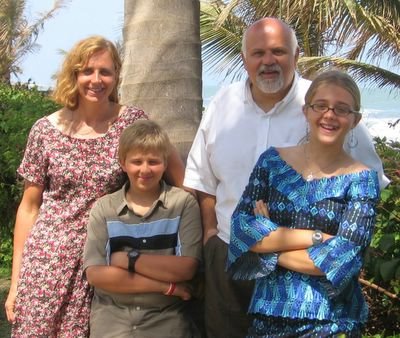Weather: Mostly hot and humid-- some rain at the end of last week as we begin to transition out of the dry season. Temps in the 90s and very humid. Not good container unloading/box carrying and sorting weather. Tuesday the 8th, we recieved heavy rain for the first time in four months. We got about two inches in the space of and hour. It is marks the begining of the end of this year's dry season.
This is going to be another week of "post-as-post-can" I'm sorry to report. The internet cafe we usually haunt-- which is the fastest commercial site in the country when running-- continues to limp along with generator problems. This puts us at the mercy of other places, most of which are much slower and cannot handle photo uploads. Actually, with all the error messages I'm getting, I'll be lucky if I get this note off.
After waiting ten weeks and multiple frustrating false starts, we finally got the container we've been waiting for out of the port. From the 40' foot long steel box, we extracted hundreds of cardboard boxes and bicycles bound for 1)the YMCA 2) Catholic schools around Monrovia 3) Five local school libraries we (Active Kids Canada, some of you, the schools and the Reeds) helped build, and 4)LEAD. Renita and her Liberian crew unpacked the container at the YMCA on Wednesday April 2, and then took the stuff for our five libraries and LEAD to our house. (We knew that if it came during the week, one of us would not be able to be there because of the alternating nature of our schedules. I felt bad-- it came on Wednesday-- because I had to teach at MPCHS. If it had come on Tuesday or Thursday, I would have had the unloading job.)
Our take was 300 boxes, mostly of books-- about 50lbs each--and a few bikes. We spent the next three exausting days sorting and organizing the haul into essentially six piles of boxes-- 5 to the schools, 1 to LEAD. Each pile has about 50 boxes, sorted according to subject and grade. It was brutal work for the kids and me, but nobody worked half as hard as Renita. We had to work in our yard because we could not fit half of it all in the house. Naturally, it rained Thursday and Friday, the first time its rained two consecutive days since November. So we used the big tarps Renita's mom had sent along and created a roof over our heads. We finished after a 12 hour marathon session Saturday, and Sunday, we sort of rested from our labors. Both Renita and I prompltly got sick Sunday, probably from the let down of being on container duty for the past few weeks.
Monday the 7th, Renita had the happy tasks of delivering the thousands of text books, library books and reference books to the libraries. Fortunately, she did no more heavy lifting-- the schools had crews unloading their prizes.
UPDATE Wednesday, April 9
I mentioned before that we were feeling a bit under the weatther after our ordeal with the container and boxes. It turns out Renita was much more under it that I. She has malaria. This is the second time she has contracted it and feels appropriately terrible. Vomiting, fever, aches, nausea, headaches, the typical symptoms. However, she is taking medicine and should be better soon.
Now for the pictures of our week with the boxes.

Gauntlet Week begins Wednesday the 2nd at the Port. This is our second trip in three days to get the container. First time we waited four hours only to find out a loading crane was busted. Second time, Renita waited in the heat four more hours, but finally after being in the port 10 weeks...

...here it comes! Forty feet of good wishes from Canada, all waiting to be unpacked, reorganized and delivered.

Opening the container and hauling out the 60 bikes first. Then the boxes. We got our three hundred-- it was exhausting working in the heat and humidity-- and headed home.

A literal ton of books and supplies waiting under the tarps to be organized, sorted, and divided.

Saturday morning, we head for the finish line. With Renita consulting her list, Eastman, Noah, Trokon, John and Alex shuffle boxes according to her commands.

All done and under the tarp by nightfall Saturday. Five piles of over fifty boxes each, waiting for delivery. We slept well.

Monday, the books were delivered-- the scene was the same at five schools-- kids and staff claiming hundreds of books and oodles of supplies-- thanks to Active Kids Canada, and many friends both in Canada and Liberia.
 Actually, the tag line ought to be "Your Gateway to Disappointment, Frustration, and Days of Waiting Until We Fix the Only Plane We've Got for this Route." I guess its better than crashing in one of these buckets.
Actually, the tag line ought to be "Your Gateway to Disappointment, Frustration, and Days of Waiting Until We Fix the Only Plane We've Got for this Route." I guess its better than crashing in one of these buckets.


























